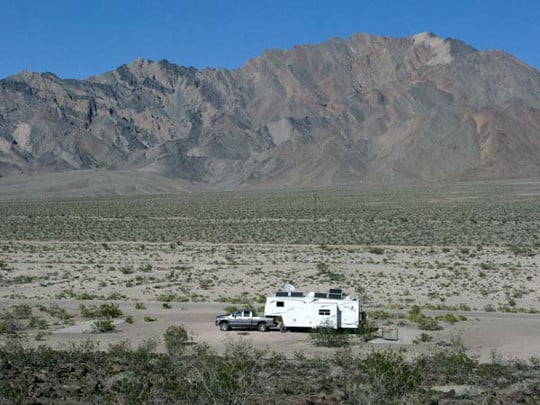Lackluster health insurance is something my husband and I have lived with for the last 20 years. But we put that worry in the back of heads, because we feel the trade-offs are well worth it when you can change up your office view whenever you want. What do you think?

Our office view last week.
As self-employed working people we have never enjoyed the luxury of employer-provided insurance policies, so we do our best to stay healthy. We’re not total health freaks, but we exercise regularly, eat a vegetarian diet and try to keep our alcohol consumption to a respectable amount. We’re not at the age “when the wheels start falling off” (according to my sister), but we’re closer to 50 than 40 now, so we treasure our good health even more.
Since we became full-timers, our crappy health insurance has been especially concerning because now Blue Cross and other health insurance providers eliminated PPO health insurance plans. With only HMO plans available, full-time RVers are limited to obtaining covered medical care in their home states. Now, staying fit is even more critical for full-timers like us.
Telemedicine; Affordable Health Care for RVers
We recently started subscribing to a monthly telemedicine service called “Teladoc”, provided by a company called Carington. This is a service that for $14.95 a month gives us 24/7 access to online, phone and web-based consultations with U.S.-licensed medical doctors whenever we have a health concern. After reading rave reviews from other full-timers about Teladoc how works for full-timers, we purchased it through the Escapees RV Club-endorsed RVer Insurance Exchange. Here’s why we think Teladoc is a good buy for full-timers:
- You can call or email anytime and schedule an appointment with a doctor
- The physician will ask you a number of questions to help you decide if your symptoms are minor enough to manage on your own, or serious enough to warrant a visit to urgent care.
- If needed, the doctor can prescribe and order non-narcotic medications with your nearest pharmacy.
- Carington also has dental and vision discounts within their plan, as well as health and wellness guidance with online webinars, newsletters and more. You’ll have to check it out to see if it’s right for you.
Death Valley Medical Drama
Because we choose to camp in extremely remote places, we are often far from emergency or medical care. We are too young to qualify for a pre-paid life-flight medivac service through a company like MASA (many full-timers and rural residents subscribe to services like this), so we stay in the sticks on a wing and a prayer that we’ll never need a hospital. We’ve been fortunate that luck and health have been on our side, until this year when we had two non-emergency situations that needed a health care provider.
Last January while staying at the Slabs in Southern California, I came down with a recurring but minor condition and needed a doctor. Unfortunately my usual go-to method of checking into the nearest Minute Clinic was not going to work – the closest walk-in, pay-on-the-spot clinic was almost two hours away. Instead I had to endure a FOUR HOUR wait in a government-run medical clinic on the boarder. You can probably guess what that was like.
In the meantime, we had hoped to never use the Teladoc service but within one month of registering it came in very handy while camped out in Death Valley. Next week I’ll tell you exactly how the service worked out for us and the most important thing you should do first if you become a Teladoc user.

Leave a Reply